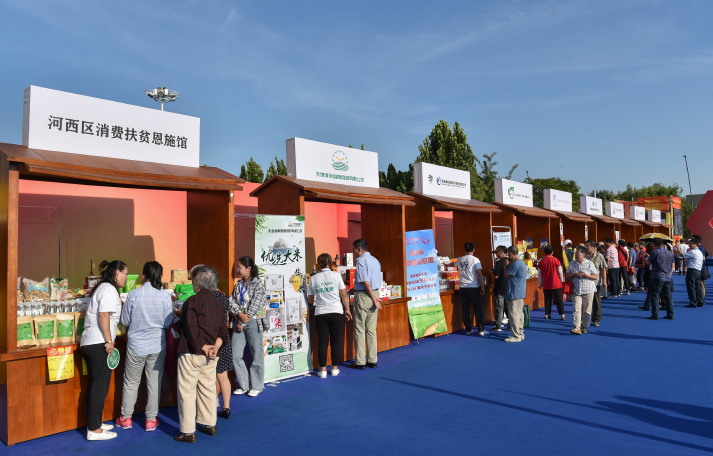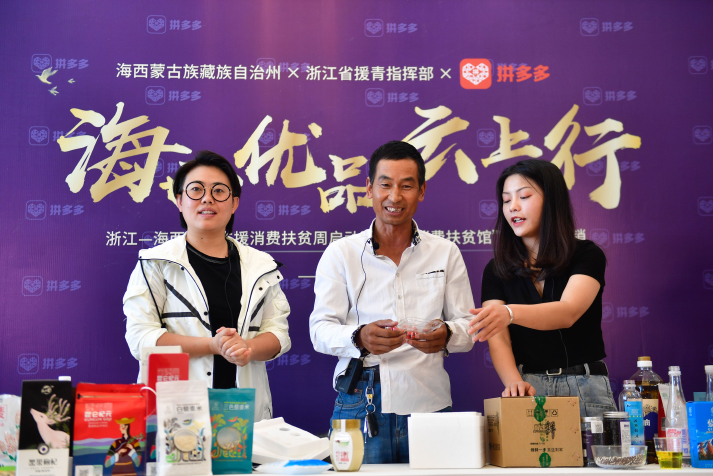| China |
| Nationwide campaign launched to facilitate poverty alleviation through consumption | |
|
|
 A promotional activity for agricultural products from impoverished areas is held in Hexi District, Tianjin in north China, on September 4 (XINHUA)
Hu Kaixin, a 27-year-old office clerk in Changchun, Jilin Province in northeast China, is used to purchasing goods from producers and vendors all over the country at great deals online. With the recent boom in live-streaming marketing activities, she particularly likes to buy agricultural products from poverty-stricken villages that are recommended by well-known live-streamers during their shows. For example, she has bought seasonal produce and local specialties such as hams, flowers and fresh fruits from Yunnan Province in southwest China.
Hu said most of the food she bought online was delicious. "Along with getting quality goods, I'm also very happy to help poor villagers and farmers who have difficulty selling their fruits of labor. It's a win-win effort," she told Beijing Review. Most of the live-streaming shopping events that Hu recently participated in were part of a pro-consumption campaign that the Chinese Government launched in September to boost the sales of products from impoverished areas and promote poverty alleviation. "The campaign signifies that the relief-through-consumption strategy has reached a new level," Hong Tianyun, deputy head of the State Council Leading Group Office of Poverty Alleviation and Development, said at a press conference in Beijing on August 28. Sales of products from impoverished areas have topped 102.7 billion yuan ($15.1 billion) amid consumption-powered poverty reduction efforts, according to the office. An all-in push Themed Involving Tens of Thousands of Enterprises and Hundreds of Millions of Chinese Consumers, the campaign is significant since China aims at eliminating absolute poverty and completing building a moderately prosperous society in all respects by 2020. Jointly organized by 11 central government departments, the month-long sales promotion consists of five special activities to raise public awareness of the e-commerce platforms and brick-and-mortar venues where products from poor regions are available. "We hope that urban residents can buy quality goods on online and offline platforms and that products from poor areas can be profitable for rural sellers," Hong said. According to Wang Dayang, a senior official with the leading group office, there are three major channels to sell products from poor areas. The first is websites launched by e-commerce platforms like JD.com and Tmall.com, as well as designated areas in supermarkets. The second is online and brick-and-mortar specialty stores, where commodities are categorized by region. The third is an increasing number of vending machines installed in shopping malls, hospitals and train stations. The Chinese Farmers' Harvest Festival fell on September 23 this year, and the month-long campaign added to the celebration with various events. Different provinces, autonomous regions and municipalities made plans based on their own features and unique conditions. In January, the State Council released a guideline calling for wealthier provinces and municipalities in the east and south to help less developed central and western regions sell poverty-relief products, foster rural industries and generate jobs. For instance, the southern province of Guangdong held farm produce expos in cooperation with Guangxi Zhuang Autonomous Region and Sichuan and Yunnan provinces. The events generated sales of more than 24 billion yuan ($3.55 billion) worth of poverty-relief goods, according to Liang Jian, deputy head of the Guangdong Provincial Office of Poverty Relief and Development. In addition, as a way to fulfill their corporate responsibilities, some large companies have established food supply chains in poverty-stricken areas for their canteens and encourage employees to buy their products by organizing group purchases.  Li Fuwen (center), a resident of Haixi Mongolian and Tibetan Autonomous Prefecture, Qinghai Province in northwest China, sells homegrown wolfberries via live-streaming with the help of two hosts on September 3 A promotional activity for agricultural products from impoverished areas in Hexi District, Tianjin in north China, on September 4 (XINHUA)
Building recognition Established in 1999, Xiangyu is a premier olive oil production company in Longnan, Gansu Province in northwest China. Over the last two decades it has directly and indirectly helped over 4,600 local households shake off poverty and generated over 970 million yuan ($143 million) in rural income. At a press conference in early September, Liu Hongyu, Board Chair of the company, said the promotion campaign will help boost small and medium-sized businesses like hers, which cannot afford commercials on major platforms like the state television to promote their organic products nationwide. Xiangyu has been authorized by the Gansu Provincial Government to add the Ganwei label on its products. Established in 2019, Ganwei is an officially recognized farm produce quality certificate allocated to 200 enterprises in Gansu. In this way, the province aims to build a brand unique to its specialty products, expand their sales channels and earn a bigger share of the market. Taking advantage of the government's endorsement, Xiangyu has signed cooperation deals with large state-owned enterprises to help its sales. Hong said consumers and governments at all levels put great importance on brand building. "It takes both the power of the market and the encouragement of the government to bring premier quality products from the remote mountainous areas to the entire country," he said, adding that creating famous national brands is crucial. With the development of industries in poverty-stricken areas, relief-through-consumption is a platform that can help companies with promotion and enable more consumers to get to know them, Hong said. Against all odds This summer, severe flooding in south China caused lackluster sales of agricultural products in affected areas due to the disruption of supply chains and infrastructure damage. Ge Rongbin's humble poultry business in Nushanhu Town, Anhui Province in east China, was severely affected by flooding in July. Although the fowl were successfully evacuated, selling them became a problem. However, with the help of the local government, Ge found an online store and was able to sell about 400 chickens, ducks and geese. Hong said boosting the sales of products and services from impoverished areas is also an effective way of consolidating the country's poverty alleviation achievements amid efforts to restore livelihood and production activities following the novel coronavirus disease epidemic and natural disasters. It is also a powerful measure to prevent rural residents from falling back to poverty. (Print Edition Title: Spending is Power) Copyedited by Rebeca Toledo Comments to luyan@bjreview.com |
|
||||||||||||||||||||||||||||||
|